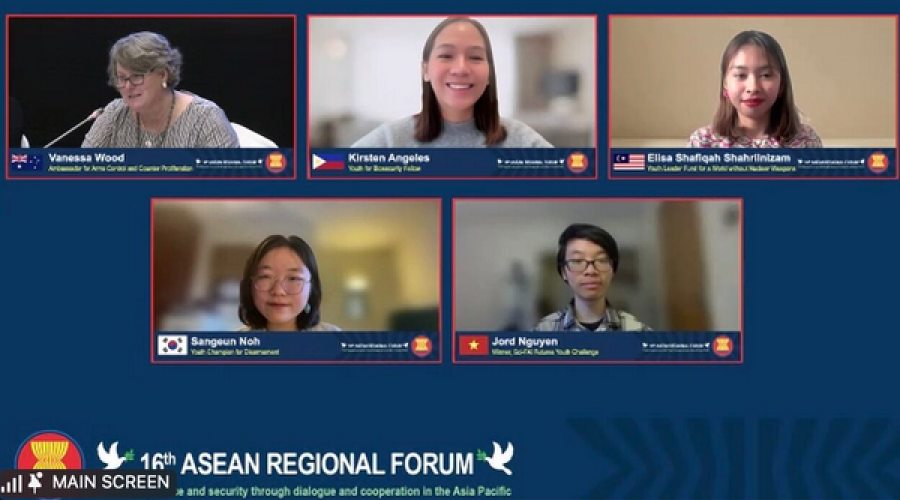
When you’re young and aspiring towards a better future, it can feel like you often must play the long game before being able to make an impact. It is rare for young people to speak directly to diplomats, policymakers, and security experts. So, having the chance to participate in a high-level space, surrounded by officials working in the field of disarmament and non-proliferation, can make the future feel a little more hopeful.
On 20 March 2025, we — Kirsten (from the Philippines) and Sangeun (from the Republic of Korea) — spoke at the 16th ASEAN Regional Forum (ARF) Intersessional Meeting on Non-Proliferation and Disarmament, held in Manila at the invitation of co-chairs of the Meeting, Australia, New Zealand and the Philippines. Alongside fellow youth panelists Elisa Shafiqah (from Malaysia) and Jord Nguyen (from Vietnam), we joined a session titled “Youth Perspectives on Non-Proliferation and Disarmament.” Each of us as experts in our own fields brought diverse perspectives to the table—nuclear disarmament, AI safety, art and advocacy, and biosecurity—while sharing the same belief that youth voices matter.
The ARF, a forum for advancing trust and cooperation on regional security in the Asia-Pacific region, was a rare opportunity to speak not just about our concerns, but from our expertise. It was energizing to exchange ideas with fellow young professionals from across Southeast and East Asia, each bringing a grounded, forward-looking perspective.
From biosecurity to AI safety, security cannot be sustainable without inclusion
We – Kirsten, Sangeun, Elisa and Jord – all gave our unique perspectives to the discussion.
Kirsten emphasized that biosecurity is a core pillar of modern disarmament, especially as synthetic biology and dual-use technologies become more accessible. She called for shifting from symbolic Global South inclusion to structural leadership and governance autonomy — because preventing biological threats is not just a health issue, it is a security imperative.
Sangeun explored how art can reshape the way people connect with disarmament. In a world flooded with information, art cuts through the noise — it builds empathy, curiosity, and a deeper emotional understanding of abstract or technical issues.
Elisa emphasized centering survivor voices and affected communities in disarmament conversations. Especially in dealing with chemical, biological, radiological, and nuclear (CBRN) threats, where policy often focuses on deterrence, there’s immense value in listening to lived experience and building from the ground up.
Jord unpacked the challenge of general-purpose artificial intelligence (AI), already surpassing human capability in several domains and advancing faster than most governance frameworks can keep up. We still don’t fully understand how these systems work, let alone how to reliably control them, and global AI governance remains fragmented at best. It’s a growing gap that carries real global consequences.
Despite our different focuses — biosecurity, art and culture, nuclear disarmament, and AI safety — we were struck by a shared thread: a sense of urgency, a commitment to long-term thinking, and the belief that security cannot be truly sustainable without inclusion. We came from different countries and fields, but what united us was a common push: to move from representation to real participation, and from symbolic dialogue to structural change.
Young people must be heard when decisions about the future of disarmament are being made
As Sangeun noted during the panel, disarmament is inherently future-facing. That makes young people essential stakeholders—not just because we are digital natives or more fluent in emerging tech, but because we will be living with the long-term consequences of today’s decisions. Inclusive decision-making isn’t a courtesy. It is a necessity.
The challenges we face today, whether in biosecurity, AI, or nuclear governance, demand more than representation. They require real pathways for youth expertise to shape policy, global mechanisms that reflect regional realities, and a shift away from symbolic inclusion toward structural participation. These are not “youth issues” or “Global South issues” — they are global challenges that impact people regardless of their nationality, age or geographic location.
To decide our future, we, young people, must be heard. And to be heard, we must take the agency to speak — even when it might feel scary, even when the room is filled with titles and authority. Every panel discussion like the one we participated in with ARF is a start. But it cannot end with one discussion. If senior leaders are serious about peace and security, youth inclusion must evolve from occasional invitations to sustained participation. When the opportunity to participate comes, it is not just about being heard — it is about being taken seriously.
Special thanks to Vanessa Wood, Australia’s Ambassador for Arms Control and Counter-Proliferation, and the distinguished ASEAN delegates for their engagement. And to the ARF organizers, United Nations Office for Disarmament Affairs, and Australia’s Department of Foreign Affairs and Trade—thank you for making space for our voices.
We are thankful to Jord and Elisa for their input on this piece.